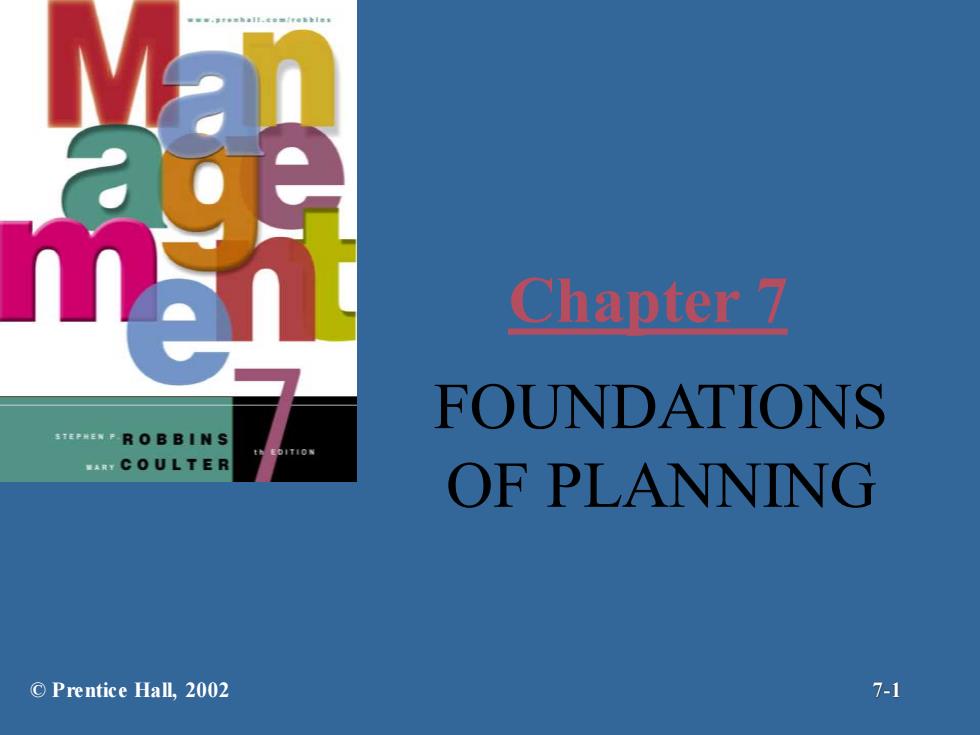
Chapter 7 FOUNDATIONS TDROBBI NS ACOULTER OF PLANNING ©Prentice Hall,.2002 7-1
Chapter 7 FOUNDATIONS OF PLANNING © Prentice Hall, 2002 7-1
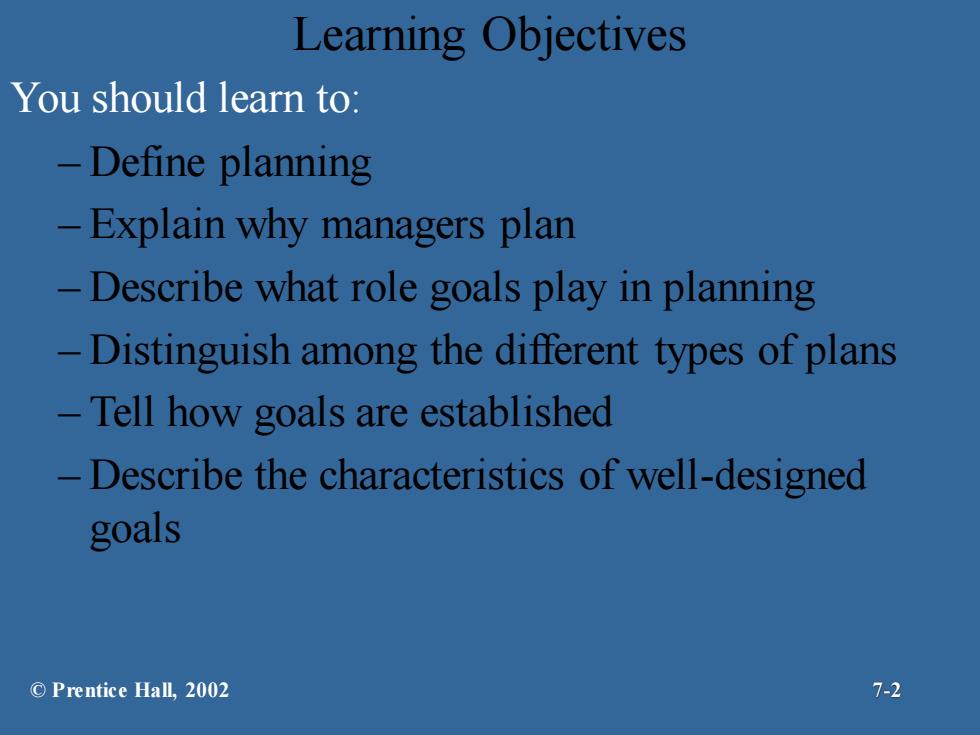
Learning Objectives You should learn to: -Define planning Explain why managers plan Describe what role goals play in planning Distinguish among the different types of plans -Tell how goals are established Describe the characteristics of well-designed goals ©Prentice Hall,2002 7-2
Learning Objectives You should learn to: – Define planning – Explain why managers plan – Describe what role goals play in planning – Distinguish among the different types of plans – Tell how goals are established – Describe the characteristics of well-designed goals © Prentice Hall, 2002 7-2
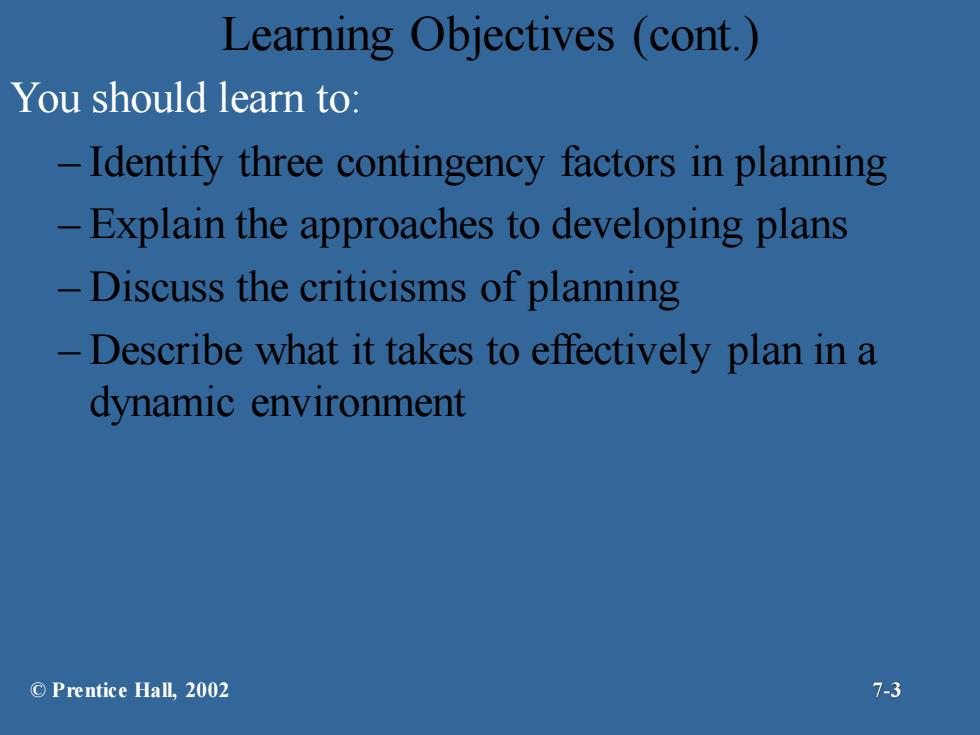
Learning Objectives (cont. You should learn to: Identify three contingency factors in planning Explain the approaches to developing plans Discuss the criticisms of planning Describe what it takes to effectively plan in a dynamic environment ©Prentice Hall,.2002 7-3
Learning Objectives (cont.) You should learn to: – Identify three contingency factors in planning – Explain the approaches to developing plans – Discuss the criticisms of planning – Describe what it takes to effectively plan in a dynamic environment © Prentice Hall, 2002 7-3
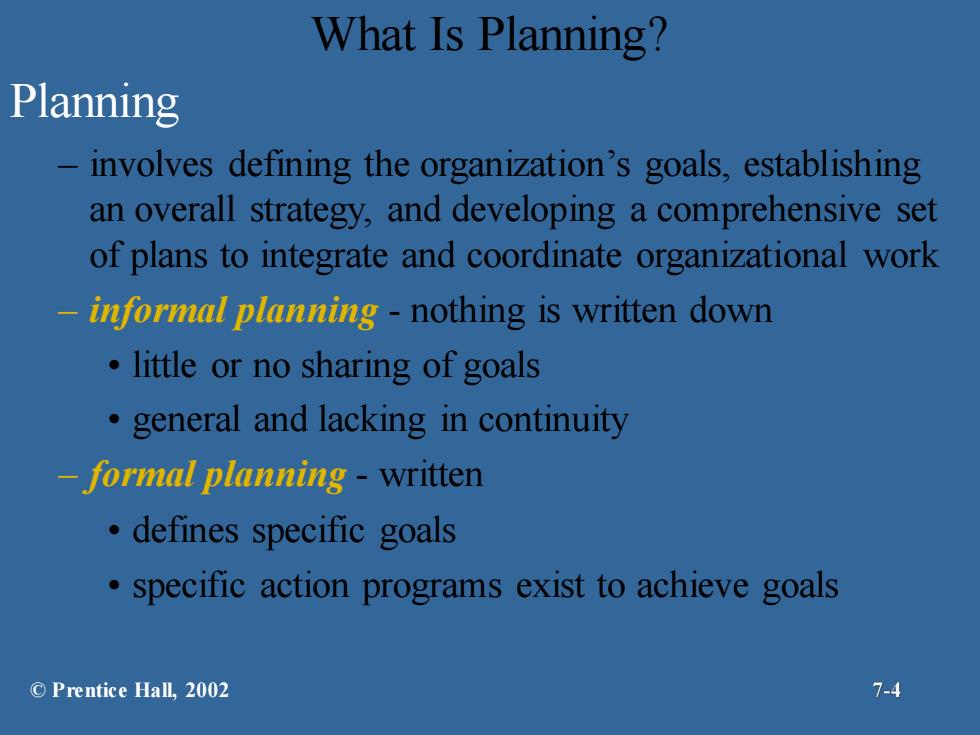
What Is Planning? Planning -involves defining the organization's goals,establishing an overall strategy,and developing a comprehensive set of plans to integrate and coordinate organizational work informall planning-nothing is written down little or no sharing of goals general and lacking in continuity -formal planning-written defines specific goals specific action programs exist to achieve goals ©Prentice Hal,2002 7-4
What Is Planning? Planning – involves defining the organization’s goals, establishing an overall strategy, and developing a comprehensive set of plans to integrate and coordinate organizational work – informal planning - nothing is written down • little or no sharing of goals • general and lacking in continuity – formal planning - written • defines specific goals • specific action programs exist to achieve goals © Prentice Hall, 2002 7-4
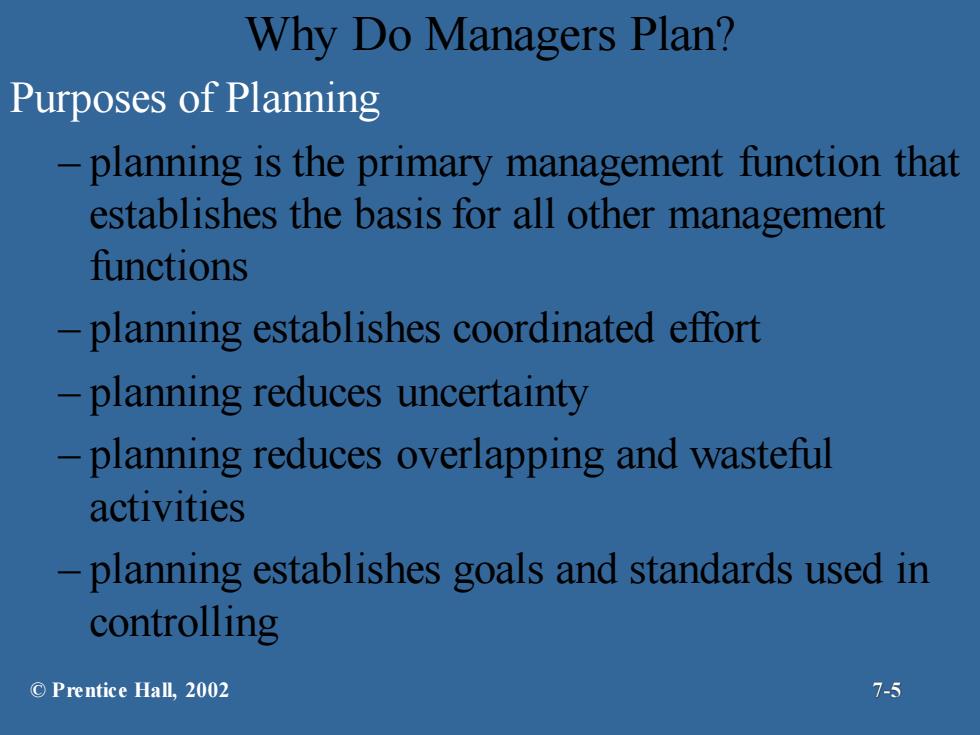
Why Do Managers Plan? Purposes of Planning planning is the primary management function that establishes the basis for all other management functions planning establishes coordinated effort planning reduces uncertainty planning reduces overlapping and wasteful activities planning establishes goals and standards used in controlling ©Prentice Hall,2002 7-5
Why Do Managers Plan? Purposes of Planning – planning is the primary management function that establishes the basis for all other management functions – planning establishes coordinated effort – planning reduces uncertainty – planning reduces overlapping and wasteful activities – planning establishes goals and standards used in controlling © Prentice Hall, 2002 7-5

Why Do Managers Plan?(cont.) Planning and Performance generally speaking,formal planning is associated with ·higher profits higher return on assets quality of the planning process and the appropriate implementation of the plans probably contribute more to high performance than does the extent of planning external environment may undermine the effects of formal planning planning performance relationship is influenced by the planning time frame ©Prentice Hall,.2002 7-6
Why Do Managers Plan? (cont.) Planning and Performance – generally speaking, formal planning is associated with: • higher profits • higher return on assets – quality of the planning process and the appropriate implementation of the plans probably contribute more to high performance than does the extent of planning – external environment may undermine the effects of formal planning – planning/performance relationship is influenced by the planning time frame © Prentice Hall, 2002 7-6
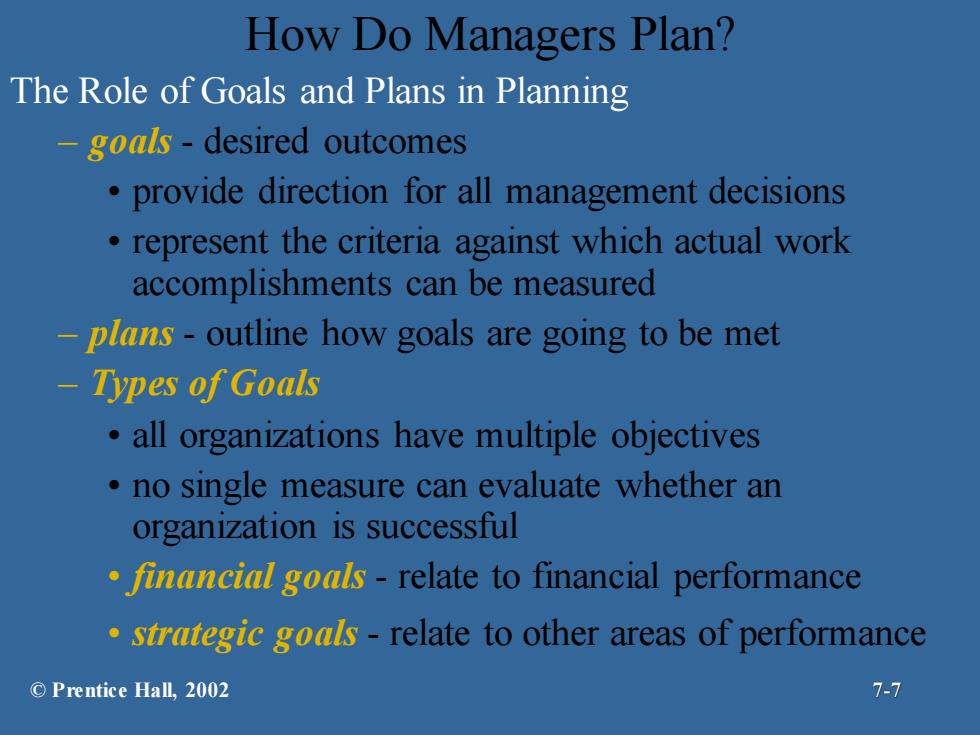
How Do Managers Plan? The Role of Goals and Plans in Planning -goal-desired outcomes provide direction for all management decisions represent the criteria against which actual work accomplishments can be measured pllads-outline how goals are going to be met Types of Goals all organizations have multiple objectives no single measure can evaluate whether an organization is successful financiall goalks-relate to financial performance strutegic goul-relate to other areas of performance ©Prentice Hall,2002 7-7
How Do Managers Plan? The Role of Goals and Plans in Planning – goals - desired outcomes • provide direction for all management decisions • represent the criteria against which actual work accomplishments can be measured – plans - outline how goals are going to be met – Types of Goals • all organizations have multiple objectives • no single measure can evaluate whether an organization is successful • financial goals - relate to financial performance • strategic goals - relate to other areas of performance © Prentice Hall, 2002 7-7
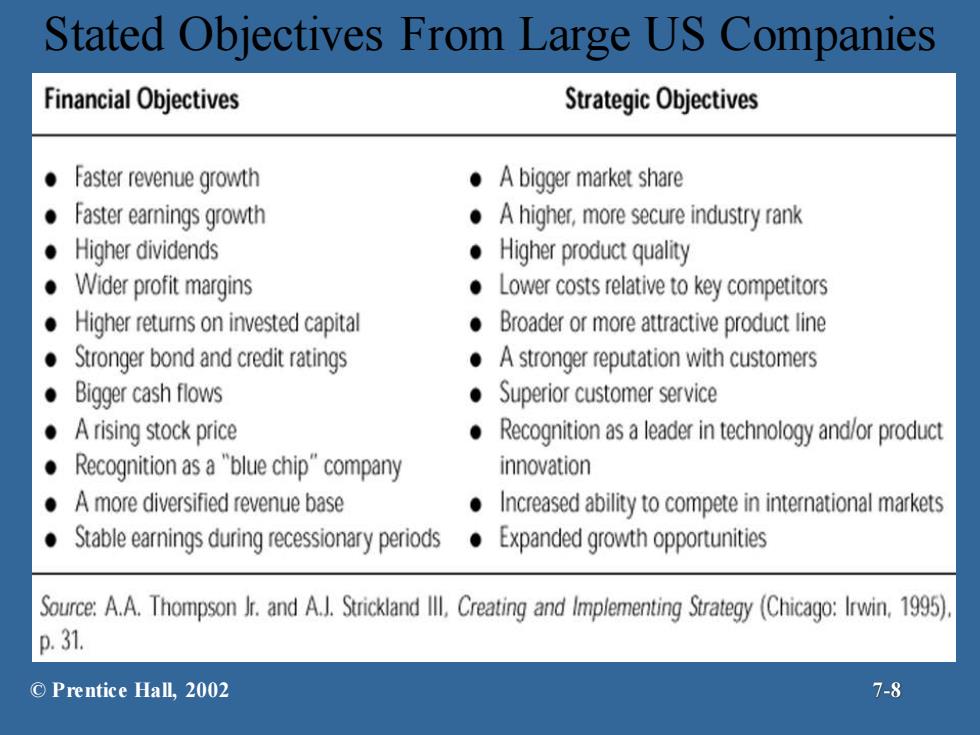
Stated Objectives From Large US Companies Financial Objectives Strategic Objectives Faster revenue growth ·A bigger market share Faster eamnings growth A higher,more secure industry rank Higher dividends Higher product quality ● Wider profit margins Lower costs relative to key competitors ● Higher retus on invested capital Broader or more attractive product line ● Stronger bond and credit ratings ● A stronger reputation with customers Bigger cash flows Superior customer service ● A rising stock price Recognition as a leader in technology and/or product ● Recognition as a"blue chip"company innovation A more diversified revenue base Increased ability to compete in international markets Stable earnings during recessionary periods Expanded growth opportunities Source:A.A.Thompson.and A.Stricklandl Creating and Implementing Strategy(Chicago:Irwin.99). p.31. ©Prentice Hall,2002 7-8
Stated Objectives From Large US Companies © Prentice Hall, 2002 7-8
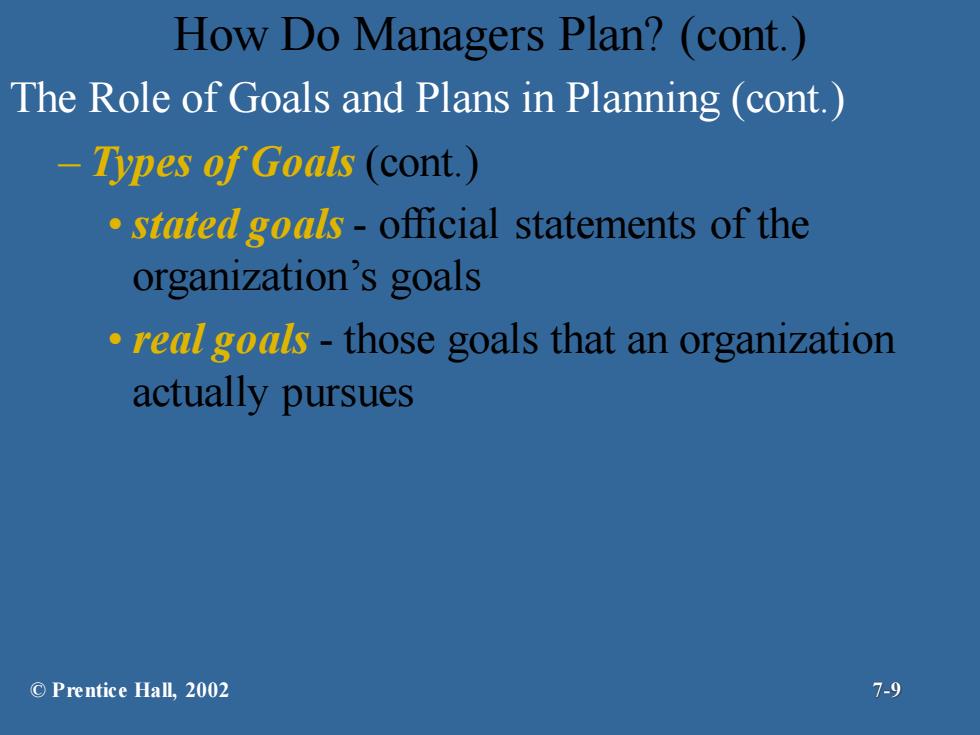
How Do Managers Plan?(cont.) The Role of Goals and Plans in Planning (cont.) Types of Goals (cont.) statedgoals-official statements of the organization's goals reall goulls-those goals that an organization actually pursues ©Prentice Hall,.2002 7-9
How Do Managers Plan? (cont.) The Role of Goals and Plans in Planning (cont.) – Types of Goals (cont.) • stated goals - official statements of the organization’s goals • real goals - those goals that an organization actually pursues © Prentice Hall, 2002 7-9
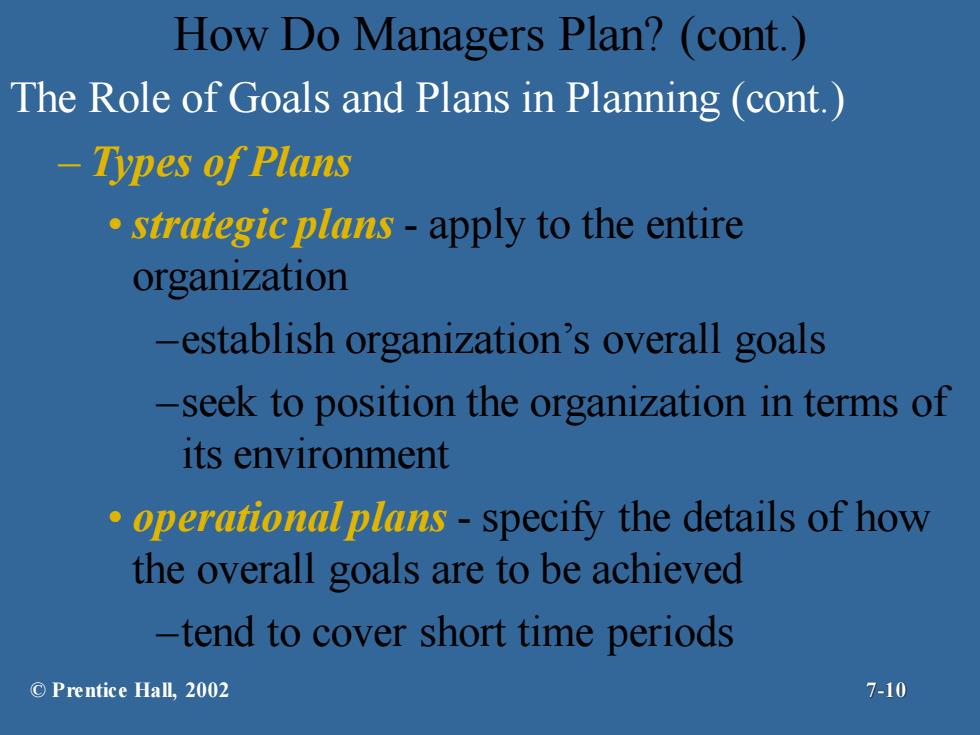
How Do Managers Plan?(cont. The Role of Goals and Plans in Planning (cont.) -Types of Plans strategic plans-apply to the entire organi☑ation -establish organization's overall goals -seek to position the organization in terms of its environment operattionallplans-specify the details of how the overall goals are to be achieved -tend to cover short time periods ©Prentice Hall,2002 7-10
How Do Managers Plan? (cont.) The Role of Goals and Plans in Planning (cont.) – Types of Plans • strategic plans - apply to the entire organization –establish organization’s overall goals –seek to position the organization in terms of its environment • operational plans - specify the details of how the overall goals are to be achieved –tend to cover short time periods © Prentice Hall, 2002 7-10